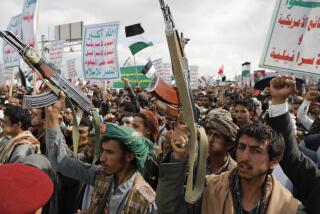Yemen Says Rebel Cleric Slain in Hide-Out; Clashes Continue
- Share via
SANA, Yemen — A rebel cleric who led his Shiite Muslim followers in a months-long guerrilla war against the Yemeni government was tracked down in a remote mountain redoubt Friday and slain by security forces, officials announced.
After eluding an intense manhunt for much of the summer, Hussein Houthi and a group of followers were cornered in the rugged Maran mountains in Sadah province north of the capital, Sana. The vehemently anti-American cleric was killed in a firefight in a cave complex where he had been hiding with his wife and two children, Yemeni officials said.
Houthi’s body was brought to Sana to confirm his identity, and his family was allowed to go free. Meanwhile, clashes with his followers continued at the cave complex Friday night.
Thousands of soldiers backed by warplanes spent the last several months combing the mountains for Houthi, who was accused of exhorting thousands of young followers to take up arms against the government.
More than 600 people have been killed in clashes between Houthi’s Believing Youth militant group and Yemeni troops in recent months -- a continuous, embarrassing reminder of the government’s struggle to control its tribal provinces. Officials had offered a $54,000 reward for Houthi’s capture and had enlisted the help of local tribes.
“Today, all the military and security operations to quell the rebellion launched by the so-called Hussein al-Houthi and his supporters have finished with the killing of Houthi and a number of his aides,” read a joint statement released Friday by the defense and interior ministers. “President Ali Abdullah Saleh urges all citizens who were affected by the fighting to return to their homes and carry on with their lives.”
Houthi’s movement was not thought to be connected to the Al Qaeda terrorist network of Osama bin Laden, whose ancestral home is in Yemen. However, Yemeni officials have accused the cleric of working as a proxy for foreigners intent on destabilizing the nation’s ties with the United States. In an interview this month, Yemeni Foreign Minister Abubakr al Qerbi said Houthi had foreign sponsors.
Houthi’s followers say his movement has been unfairly targeted because of its anti-American rhetoric.
Before the clashes, Houthi was a little-known Shiite cleric of the Zaidi sub-sect predominant in northern Yemen. He managed madrasas, or religious schools for young men.
Houthi incurred the government’s ire more than a year ago with his angry criticism of Yemen’s increasing cooperation with the U.S.-declared war on terrorism.
Officials say he also stockpiled weapons and gave his followers $100 payments -- a princely sum in this impoverished country, where the average per capita income is little more than $800 a year.
The fighting erupted when government forces trooped into the mountains early this summer to capture the cleric. The battles escalated, driving some villagers from their homes and provoking the government to seal off the northern mountains to tourists and trekkers.
Houthi’s rebellion touched a raw nerve in a nation that was often dismissed in the West as a gun-happy haven for terrorists and was struggling to prove that it could control its rugged expanses and comply with U.S. demands for increased cooperation in rooting out militants. Eager to shake off criticism after the October 2000 suicide bombing of the U.S. Navy destroyer Cole in a Yemeni port and the Sept. 11 attacks, this poor and isolated nation has rounded up militants, deported foreign Islamists and begun to share intelligence with the Bush administration.
In recent signs of warming relations, Yemen lifted visa restrictions for American visitors and the U.S. revoked a ban on sales of military equipment to the nation. The U.S. has also sent a small number of troops to train the Yemeni military.
More to Read
Sign up for Essential California
The most important California stories and recommendations in your inbox every morning.
You may occasionally receive promotional content from the Los Angeles Times.













